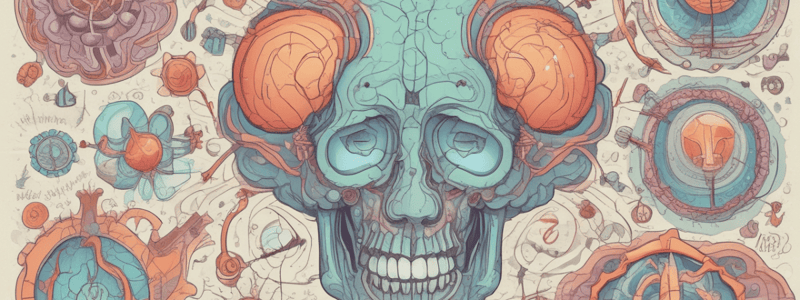Podcast
Questions and Answers
What is the primary mechanism by which SSRIs increase the amount of serotonin available in the synaptic cleft?
What is the primary mechanism by which SSRIs increase the amount of serotonin available in the synaptic cleft?
By selectively inhibiting the reuptake of serotonin by the presynaptic neuron
What is a rare but potentially life-threatening side effect of SSRIs?
What is a rare but potentially life-threatening side effect of SSRIs?
Serotonin syndrome
What type of medication is contraindicated with SSRIs due to the risk of serotonin syndrome?
What type of medication is contraindicated with SSRIs due to the risk of serotonin syndrome?
MAOIs (monoamine oxidase inhibitors)
What is one way in which SSRIs work to improve symptoms of depression and anxiety?
What is one way in which SSRIs work to improve symptoms of depression and anxiety?
What is a food substance that can interact with SSRIs and increase the risk of side effects?
What is a food substance that can interact with SSRIs and increase the risk of side effects?
Flashcards are hidden until you start studying
Study Notes
Selective Serotonin Reuptake
- SSRIs work by selectively inhibiting the reuptake of serotonin by the presynaptic neuron
- This increases the amount of serotonin available in the synaptic cleft
- Serotonin then binds to postsynaptic receptors, influencing mood, appetite, sleep, and other functions
- SSRIs do not affect the reuptake of other neurotransmitters, such as norepinephrine and dopamine
Side Effects
- Common side effects:
- Nausea and vomiting
- Headache
- Dizziness
- Fatigue
- Insomnia
- Sexual dysfunction
- Less common side effects:
- Weight gain
- Dry mouth
- Tremors
- Diarrhea
- Abdominal pain
- Rare but serious side effects:
- Serotonin syndrome (a potentially life-threatening condition)
- Increased risk of bleeding
- Allergic reactions
Interactions
- SSRIs can interact with other medications, including:
- MAOIs (monoamine oxidase inhibitors)
- Tricyclic antidepressants
- Anti-anxiety medications
- Pain medications (e.g., tramadol)
- Blood thinners (e.g., warfarin)
- SSRIs can also interact with certain foods and substances, such as:
- Grapefruit juice
- St. John's Wort
- Tyramine-containing foods (e.g., cheese, wine)
Antidepressant Effects
- SSRIs are effective in treating:
- Major depressive disorder
- Panic disorder
- Obsessive-compulsive disorder
- Post-traumatic stress disorder
- Premenstrual dysphoric disorder
- SSRIs work by:
- Enhancing serotonin's ability to regulate mood
- Increasing the production of new neurons in the hippocampus
- Improving sleep quality
- Reducing symptoms of anxiety and depression
Selective Serotonin Reuptake
- SSRIs inhibit serotonin reuptake by presynaptic neurons, increasing serotonin availability in the synaptic cleft
- This leads to serotonin binding to postsynaptic receptors, regulating mood, appetite, sleep, and other functions
Mechanism of Action
- SSRIs selectively inhibit serotonin reuptake, unlike other neurotransmitters like norepinephrine and dopamine
- Increased serotonin levels in the synaptic cleft enhance its ability to regulate mood
Side Effects
- Common side effects:
- Nausea and vomiting
- Headache
- Dizziness
- Fatigue
- Insomnia
- Sexual dysfunction
- Less common side effects:
- Weight gain
- Dry mouth
- Tremors
- Diarrhea
- Abdominal pain
- Rare but serious side effects:
- Serotonin syndrome (a potentially life-threatening condition)
- Increased risk of bleeding
- Allergic reactions
Interactions
- SSRIs interact with:
- MAOIs (monoamine oxidase inhibitors)
- Tricyclic antidepressants
- Anti-anxiety medications
- Pain medications (e.g., tramadol)
- Blood thinners (e.g., warfarin)
- Grapefruit juice
- St.John's Wort
- Tyramine-containing foods (e.g., cheese, wine)
Therapeutic Effects
- SSRIs are effective in treating:
- Major depressive disorder
- Panic disorder
- Obsessive-compulsive disorder
- Post-traumatic stress disorder
- Premenstrual dysphoric disorder
- SSRIs improve mood regulation by:
- Enhancing serotonin's ability to regulate mood
- Increasing the production of new neurons in the hippocampus
- Improving sleep quality
- Reducing symptoms of anxiety and depression
Studying That Suits You
Use AI to generate personalized quizzes and flashcards to suit your learning preferences.




